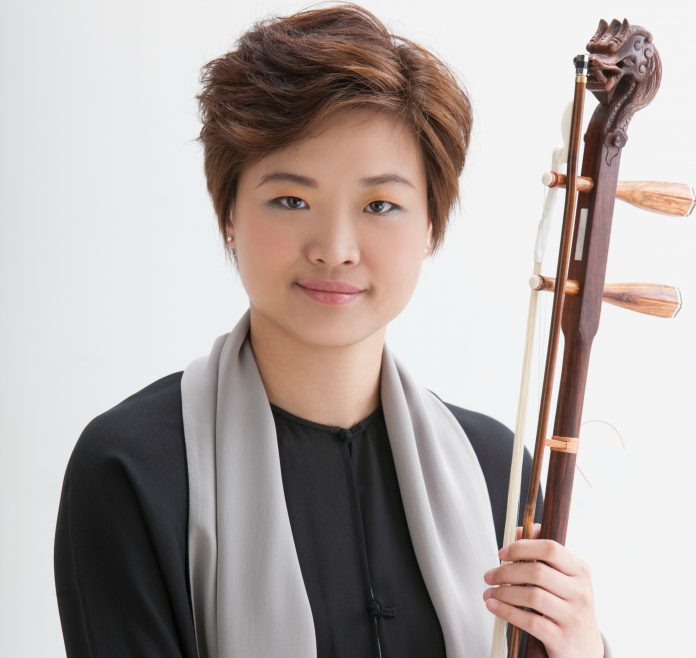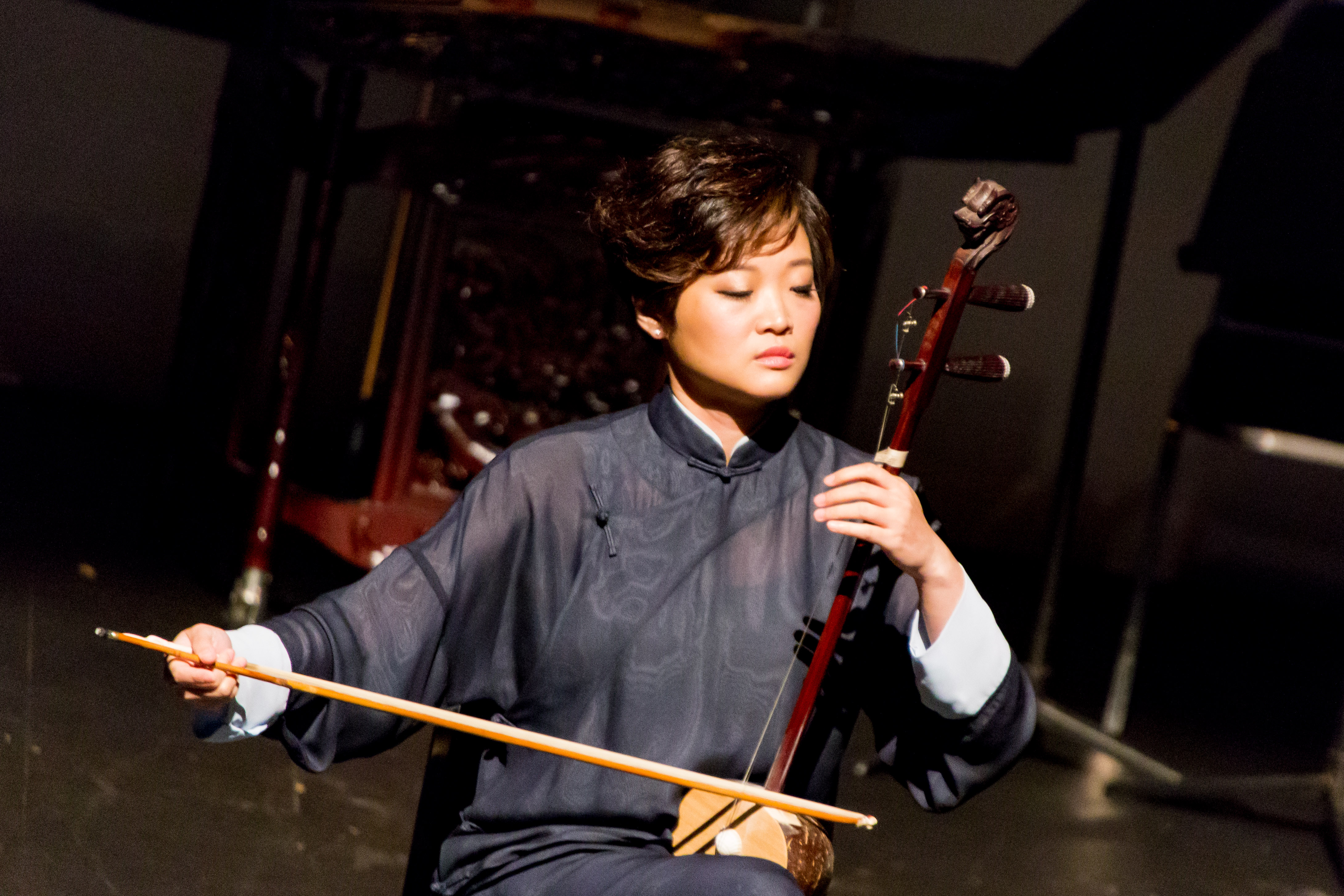
黃樂婷 Wong Lok Ting, 香港中樂團胡琴聯合首席兼高胡首席 Hong Kong Chinese Orchestra Huqin Co-Principal and Gaohu Principal.
DB: 您喜欢音乐和演奏的主要原因是什么? What do you love most about music and performing?
我喜歡音樂是因為,音樂就像詩一樣,它很抽象,雖然只是一個音一個音連接著,但是只要你把時間掌握好,它會構成一個畫面,製造氣氛,讓人感動。聽一首歌可以改變心情,也反映出你當時的心情。表現音樂也可以很個人化,或者我就是喜歡在音樂當中發現自由,它有一種神秘感。演出就不一樣了,在台上要非常專注,也不免會有緊張,往往演出的時間有很多未知數,排練就是為了把未知數減少,我會視演出是一段時間感受音樂的小總結。
I like music because it is like poetry, which is very abstract. Although it is composed of sounds and tone, if the timing is good, it will ultimately paint a vivid picture and make people move. Listening to a song can change people’s mood and reflect their emotions as well. Performing music can also be very personal, at least for me. I enjoy the freedom I found through playing music, which retains a sense of mystery. Performing on stage, however, is not the same. If I want to concentrate on stage, I will inevitably be nervous. We can never know what might happen during the performance as there are many unknowns, so rehearsal is necessary to reduce these unknowns. In addition, I treat the performance as a summary of my feelings about music for the duration of the piece.
DB: 您最喜欢的演奏曲目是哪首?What is your favourite piece of music to perform?
有太多了,我偏好經典曲目,當然不會抗拒新作品。印象最深刻是2013年跟香港中樂團用高胡協奏《梁祝》,那一場音樂會叫「心潮逐浪高」,是跟我另外三位同班同學同台合演的,能夠學以致用是很幸運的。
There are too many pieces of music I like to perform. I prefer classical songs, of course, but I will not resist new works. I was most impressed with The Butterfly Lovers in a gaohu concerto, which I played with three classmates in the concert called ‘Surf’s Up!’ I felt really lucky to have the opportunity to perform what I had learned.
DB: 二胡和高胡有什么不同?您更偏爱哪一种?What is the difference between the erhu and the gaohu and do you prefer one over the other?
小時候從二胡學起,學了幾年老師叫我在樂隊裡拉高胡才開始接觸高胡,中小學參加的樂團只會有一至兩個同學拉高胡,後來樂隊還需要我負責拉板胡、京胡等,除了二胡,早年其他胡琴基本都是自學。=
I studied erhu from a young age and a few years later, I started learning gaohu because the teacher asked me to perform it in the orchestra. In my primary and secondary schools, there were only one or two students in the orchestra performing gaohu. Later, I was also asked to perform Ban Hu, Jing Hu, etc. With the exception of the erhu, I learned all other string music myself.
高胡和二胡最主要是音高上的分別,演奏方法很相似,廣東高胡是夾腿演奏,高胡的型制比較多樣化,不像二胡比較統一。其實高胡也是從二胡演變出來的,上世紀初高胡大師呂文成先生把二胡調高然後夾腿演奏,為的是適應南方的潮濕氣候。
The playing methods of both gaohu and erhu are very similar, although they are different in pitch. Unlike the erhu, which is more unified in shape, the gaohu has a more diversified form. In fact, the gaohu also evolved from the erhu. At the beginning of the last century, gaohu master Lu Wencheng increased the height of erhu and clamped it with his legs in order to adapt it to the humid climate in Southern China.
高胡和二胡在曲目上差別較大,兩者我都喜歡,不過在香港中樂團主要是演奏高胡,所以近年觀眾會覺得我是偏重於高胡。
Gaohu and erhu differ greatly in their repertoire, but I like both of them. In the Hong Kong Chinese Orchestra, however, I mainly play gaohu. Consequently, in recent years, the audience will feel that I am biased towards the gaohu.
 DB: 在香港中乐团表演,您有哪些收获?What is the most rewarding aspect of performing with Hong Kong Chinese Orchestra?
DB: 在香港中乐团表演,您有哪些收获?What is the most rewarding aspect of performing with Hong Kong Chinese Orchestra?
在專業團體演出,好處是分工合作,藝術部和行政部都是專業人士,不像我學生時期,演出是台前幕後包辦,連約定演出場地、製作宣傳品都要親力親為,以致無法專心演奏。
Working in the professional orchestra, we are all benefit from the reasonable division of works, which means that every department are in charge of specific jobs. This is totally different from my school experience. At that time, I always had to prepare for my performance on the stage as well as details behind the scenes and that distracted me from my performance.
在樂團工作可以常常跟世界各地不同的音樂家合作,我坐在高胡聲部的第一譜台快有十年了,每次近距離看著獨奏家的背影都覺得很有趣,有時甚至看到有些人緊張到手在震抖,或有些背影是大師級的充滿信心,有些側非常放鬆投入,總之很好玩。
What’s more, HKCO has brought me many opportunities to work with musicians from different countries. I have been sitting on the first stage of the Gaohu Voice for nearly ten years and every time I look at the backs of soloists at a close distance, I find it very interesting. Some people will nervously shake their hands, while some masters are full of confidence standing on stage and some look very relaxed and devoted. In short, I find it very fun.
當然跟著樂團到世界各地演出也是難能可貴的人生經驗。
Of course, performing with the orchestra around the world also brings me valuable life experiences.
DB:假如您有机会跟任意作曲家同台表演,不管是已逝或者在世的作曲家中,您会选择跟谁合作?为什么? If you could perform alongside any composer, dead or alive, who would you choose and why?
還是會想跟二胡宗師劉天華先生見面吧,他一百年前寫了十首二胡獨奏曲,在之前二胡從來都不被視為獨奏樂器,到現在所有拉二胡的人都必定要學。記得一位老師說:「劉天華的作品明明是洋化的,可是你一聽它就是中國音樂。」這些作品還有很多被發掘的空間,每個人都可以演奏出不一樣的特色,我相信一百年後還會有人繼續演奏的。
I hope to meet Mr. Liu Tianhua, the master of erhu, who wrote ten erhu solo songs a hundred years ago. Erhu was never seen as a solo instrument until he wrote the solo songs. That’s why all erhu players must learn how to perform those songs. I remember a teacher said: “His [Liu Tianhua] work is obviously Westernized, but when you listen to it, it is Chinese music.” There is still a lot of potential for these works to be revived. Everyone can play different characteristics of those songs and even a hundred years later there will be many people playing them.
DB: 8岁您便开始学习拉奏二胡,从什么时候您开始对音乐充满激情和追求呢? You started learning the erhu at the young age of eight. When did you realise that music was your passion and calling?
剛剛學習二胡時興趣沒有很大,直到中學時期,我發現我比身邊的同學學得快,在校際音樂節拿到了幾個冠軍,老師也很鼓勵的安排了很多演出機會給我,包括15歲那一年幫我舉辦了第一場獨奏音樂會,我看觀眾和身邊的人都喜歡聽我演奏,當時我就覺得我應該要一直拉二胡,就是這樣,高中時候還沒會考就決定好要升讀演藝學院。不知道這是不是熱情,可能只是單純的喜歡吧,我也很感恩我的音樂之路走得很直很順。
I didn’t have much interest in learning erhu until I was in middle school. I discovered that I learned faster than my fellow classmates. I won several championships at the inter-school music festival. The teacher encouraged me to perform erhu and found me many opportunities. At the age of 15, I held the first solo concert. Luckily, people around me like to listen to my performance and so I thought I should always play erhu. After I failed my college entrance examination, I decided to attend the Academy of Performing Arts. Be it enthusiasm or just my interest, I’m also very grateful that my music career is such a pleasure.
www.hkco.org
WeChat: HKCO中樂團
Facebook: 香港中樂團Hong Kong Chinese Orchestra
Instagram: http://picbear.club/hkco.official






